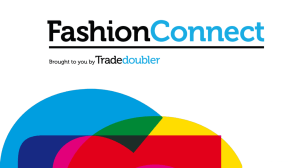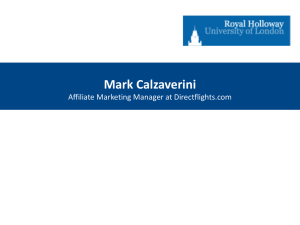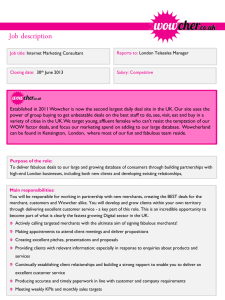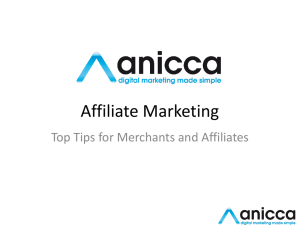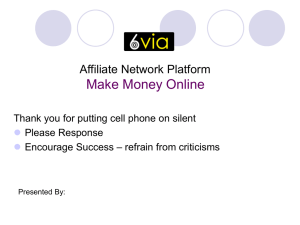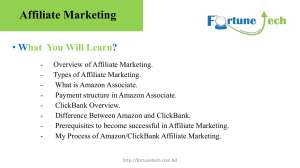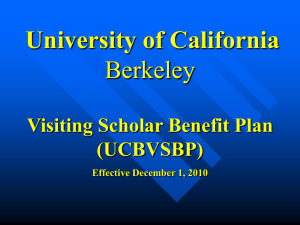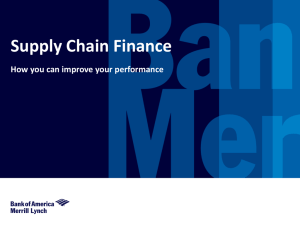Affiliates
advertisement
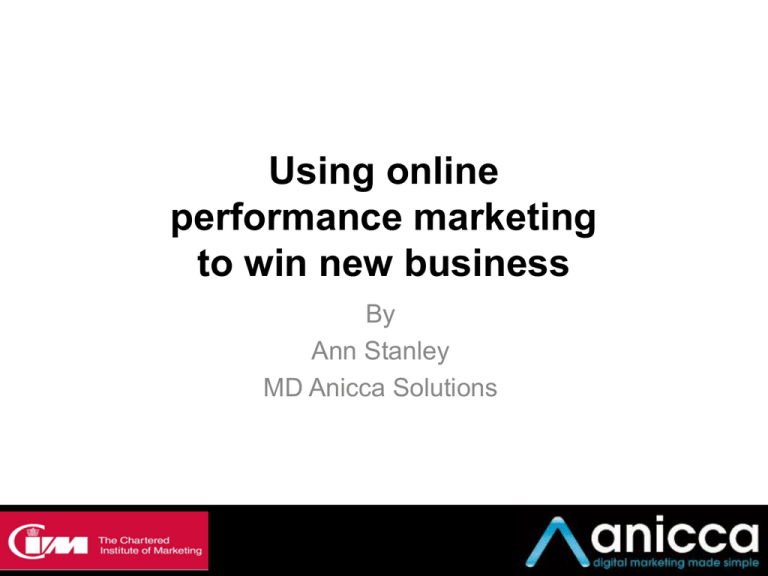
Using online performance marketing to win new business By Ann Stanley MD Anicca Solutions Agenda 1. An introduction to Pay On Performance or POP marketing 2. Affiliate marketing – the original performance marketing technique 3. Promotional marketing - voucher sites, daily deals and mobile phone deals 4. Lead generation for B2B and services 1: Introduction to POP marketing Definition of POP marketing Pay on Performance (POP) marketing is:˃ Where a third party generates sales or leads for the seller or service provider and only gets paid on performance (i.e. receives a commission for each successful sale or lead) ˃ Also called pay for performance, performance marketing, pay on results ˃ Sometimes used to describe other types of marketing such as pay on results based search engine optimisation Benefits of POP marketing ˃ You only pay on performance i.e. when a sale is made or a lead is generated ˃ Additional routes to market - other people do the marketing for you (often called affiliates) ˃ Gain new customers at low cost ˃ Often no or low start-up or upfront costs ˃ Often cheaper than PPC ˃ Faster than SEO ˃ Ability to target certain types of customers e.g. by location NOTE: You can also become an affiliate and earn extra income from your site or marketing activities Main types of POP marketing techniques You make the sale and take the money 3rd party takes the money Affiliate marketing Voucher sites Mobile/location based offers Product syndication Lead generation sites Daily deals Drop-shipping White-label websites Marketplaces Product sales and ecommerce Services and B2B Affiliate marketing Voucher sites Daily deals Mobile/location based offers Product syndication Drop-shipping White-label websites Marketplaces Affiliate marketing Voucher sites Daily deals Mobile/location based offers Lead generation sites 2: Affiliate marketing What is Affiliate Marketing? Affiliate marketing is:˃ Where a third party (or Affiliate) generates sales or leads for the seller (or Merchant) and receives a commission for each successful sale or lead ˃ It is probably the most widespread form of POP marketing ˃ There are two parties in affiliate marketing the merchant and the affiliate - which applies to you? Examples of affiliate websites Quidco - Cash back Greasy palm - Cashback Mutual points - Earn points Shopping directory Click through to M & S (note url has tracking code added) Business to business affiliates banners How does it work? Tracking Software Goes through Clicks on Redirects to Visitor Affiliate Website Sends commission Merchant Site Merchants (sellers or service provider) ˃ Merchants include both smaller businesses and large multinational companies ˃ Affiliate marketing works very well for certain types of Merchants ˃ New businesses (with no SEO traffic) ˃ Companies with low budgets or where the cost per acquisition is expensive by using other methods (such as pay per click) ˃ Big brand names that want maximum sales ˃ Most Merchants tend to use affiliate marketing to sell products to consumers (so they pay commission on a sale) ˃ Also used for lead generation (for the sale of services) and business to business (B2B) Affiliates (advertisers) ˃ Affiliates, anybody with a website or blog who wishes to generate additional income e-commerce sites Others shopping sites loyalty sites ecommerce aggregators cash-back sites point earning sites blogs ˃ Affiliates may already have established traffic, extensive database lists for email marketing, or may use SEO and PPC to get visitors to their site (and then to the merchants’ sites) How to manage an affiliate programme Key elements ˃ Having a programme and commission structure in place to attract affiliates ˃ Getting enough affiliates to join your programme ˃ Ability to track which affiliate generated a successful sale or lead ˃ Easy to manage the programme and pay the affiliates ˃ Ability to reject sales or leads if they are fraudulent or payment is not received ˃ Choice of DIY or using an affiliate network Using an affiliate network ˃ The affiliate network acts as a middleman between the merchant and pre-existing affiliates ˃ Create your own programme on the network ˃ Use network’s tracking software ˃ Let the network promote and recruit your affiliates ˃ Let the network manage all the payments ˃ Use networks tools to manage the programme ˃ do this yourself ˃ use networks in-house services (managed service) ˃ recruit an agency Affiliate networks – tracking sales/leads ˃ Sales or leads are tracked through a combination of tracking code on the Merchant’s website and Cookies added to the visitors computer ˃ The Merchant pays a price per lead or commission for each sale (via the network) ˃ The network makes all the payments to the affiliates Popular Affiliate networks The differences between networks ˃ ˃ ˃ ˃ ˃ ˃ ˃ ˃ Set-up costs Monthly costs % over-rider (commission paid to network) Number of UK affiliates Experience of Merchants similar to you Ease of use of interface Minimum contract period Other conditions and costs Overview of costs and commissions Lower Upper Commission to affiliate (sector and Merchant specific) 5% £1 cost per lead 25% £50 cost per lead Over-rider commission (paid to network) 25% of commission paid to affiliates (e.g. 12% to affiliates plus 3% to network) 30% of commission paid to affiliates (e.g. 12% to affiliates plus 3.6% to network) Set-up fee Free £2500 Monthly fee – DIY Free £300 per month £250/month (some do not offer this service) £850 per month None Minimum monthly traffic to site or monthly sales Monthly fee - managed Entry criteria Examples of commission £100 sale 10% commission to affiliate = £10 30% over-rider to network = £3 Total commission = £13 £100 sale 10% commission to affiliate = £10 25% Over-rider to network = £2.5 Total commission = £12.5 Commission and costs based on 50 sales x £100 Based on 50 sales per month 15% (£15) 10% (£10) 5% (£5) Extra revenue per month at £100 £5000 £5000 £5000 Affiliate commission £750 £500 £250 Network commission (30%) £225 £150 £75 Example Monthly network fee* £300 £300 £300 Total fees £1275 £950 £625 Cost Per Sale** £25.5 £19.0 £12.5 Monthly costs and fees * You also need to spread the cost of your set-up fee eg £2000 over 12 months ** How does this compare with the Cost Per Sale using Pay-Per-Click? Preparing your affiliate campaign Preparing your campaign ˃ Apply for an account, wait to be approved ˃ Pay deposit/set-up fee ˃ Prepare your programme for affiliates ˃ Provide description of company and website with average sales and order size ˃ Commissions offered (and/or cost per leads) ˃ Bonuses and additional commission tiers for affiliates hitting certain targets ˃ Restrictions e.g. PPC advertising on brand name ˃ Text and creative (banners and buttons) to be used on affiliate sites ˃ Add tracking code to the “thank you” page on your site and possibly create a different landing page ˃ Run test and then make live Viewing the Merchant directory Programme for selling products - example Creative Example of a programme for lead generation Creative Managing your campaign ˃ It is essential to monitor daily for bogus leads or sales (you have up to 5 days to reject) ˃ Reject unsuitable affiliates ˃ Police your affiliates especially if they are “stealing” your PPC traffic ˃ Top up your account with your credit card Likely results ˃ Expect up to 300 affiliates to sign up for a campaign within the first few month ˃ This will increase gradually over 6 months ˃ Most sales will come from a handful of sites (super-affiliates) ˃ You could receive up to a third of your traffic and sales from these sites (seen as referral traffic in Analytics) Improving your results ˃ Your commission has to be attractive for affiliates to bother to market your product/service, so compare yourself with similar programmes and offer multiple tiers (with higher commission for more sales) ˃ Offer monthly promotions, competitions and bonuses to increase take-up and sales (this may mean supplying new creative and banners) ˃ Email your affiliates (using the network software) and communicate directly with them ˃ Use an affiliate agency to talk directly with your affiliates offering product or information they can use on their sites or blogs, e.g. for competitions ˃ If you have an ecommerce website create an affiliate feed so that this can be used by product syndication sites 3: Promotional marketing Voucher Sites MyVoucherCodes MyVoucherCodes VoucherCodes VoucherCodes Daily Deals Groupon – daily email Groupon – go to website to buy Groupon deals – how does it work? ˃ Merchants are mainly local restaurants, beauticians, hotels, entertainment, days out, and other services ˃ Merchant develops a deal with Groupon, which usually has a minimum of 60% discount (usually for a minimum of 50 people) ˃ Groupon advertises the deal to their e-mail data list within the specified location and on their website as a daily deal or “side deal” ˃ Recipients are encouraged to refer the deal to friends to receive cash payment Groupon deals - limitations ˃ A minimum number of customers have to pay for the deal for it to be activated ˃ They then receive a voucher code which they redeem with the Merchant ˃ The Merchant claims around 50% of the sale value from Groupon for each customer that redeems their voucher, but loses the income from anyone who does not redeem their voucher ˃ This is best used as a method of free marketing – with the Merchant often relying on repeat business to generate real income Alternatives to Groupon ˃ KGB offer lower commission rates ˃ Offers run for a longer duration ˃ Better admin assistance, e.g. you receive all the contact details ˃ Better terms and conditions for Merchants e.g. you get all the money whether they redeem the voucher or not ˃ Main disadvantage is that they have less recipients or members (lower reach) Living Social KGB deals Wowcher Google Offers – currently available in the USA HotUkDeals Location and mobile phone deals Mobile phone and location based deals ˃ Customers download an app onto their phone ˃ When they go shopping they check-in and tell their friends where they are ˃ Customers get offered deals direct to their mobile based on their location and the shop/place they have checked into ˃ Mainly used by chains of shops, entertainment venues or restaurants, plus bigger brands ˃ These techniques are suitable for anyone with a location or premises where customers can go Facebook – check-in to get deals ˃ Use Facebook Places on your mobile to find special offers everywhere — just look for the deal logo. ˃ Check in to claim a deal at your favourite retailers, restaurants and entertainment venues ˃ Let your friends know about the deal ˃ 4 types of deal - Charity deals, Individual deals, Loyalty deals, and friends deals. Deals in Leicester Different types of deals Individual Loyalty Friends Charity 4: Lead generation for B2B and services 4 Lead generation for B2B and services Types of B2B performance marketing ˃ ˃ ˃ ˃ Affiliate marketing Voucher sites Daily deals Get a quote ˃ general business to business services or tradesman ˃ sector or skill specific ˃ Lead generation through other channels e.g. email, surveys and telesales Quotation sites Quotation sites ˃ The service provider signs up for the lead generation or quoting service ˃ Business to business all sectors e.g. Approved Index, Campaneo ˃ Tradesman sites e.g. Service Magic, MyHammer ˃ Sector or skill specific e.g. Choose Your accountant, Solar-Guide ˃ You agree to receive by email a certain number of leads per week, usually by type and location ˃ Leads vary from £5 to >£100 Quotation sites ˃ You either pay online or by invoice ˃ There is often a minimum contract and other conditions ˃ You may also get a listing within their directory ˃ Other directory sites now offer quotes as an added service e.g. Free Index Quotation services – B2B Quotation services – B2B Quotation - tradesman Sector specific quotes Sector specific quotes Any Questions? ann@anicca-solutions.com www.anicca-solutions.com 07930 384443
